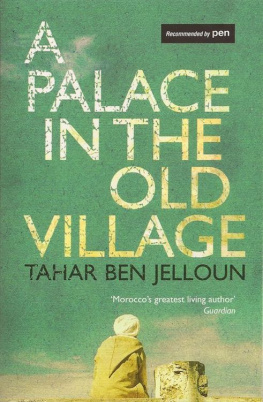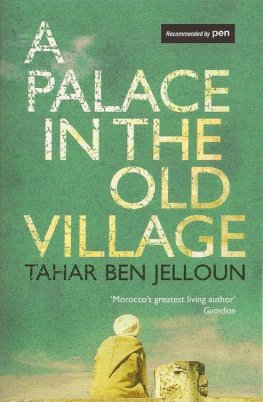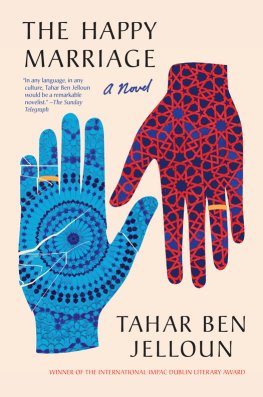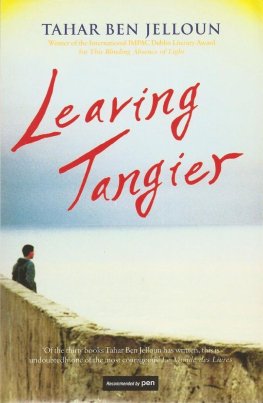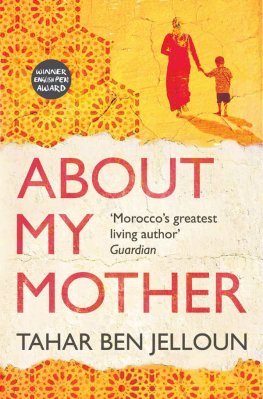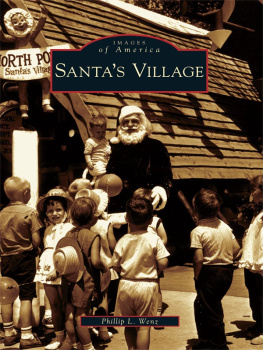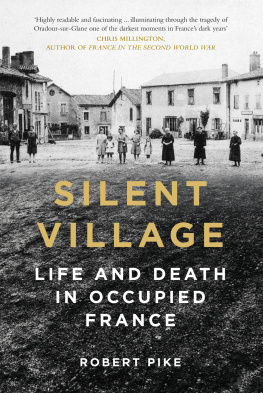A Palace in the Old Village
TAHAR BEN JELLOUN
Translated from the French by
Linda Coverdale

Contents
The hero of this book passes from one time to another, one life to another, changing centuries, countries, customs. His disorientation is reflected in his misreading of the realities around him: there are things he cannot understand, and their importance completely escapes him. Since an American reader may well be similarly unfamiliar with some of the historical and cultural references in Ben Jellouns novel, I have provided a few endnotes to explain these allusions, which are marked in the text by an asterisk.
WHEN MOHAMMED HAD FINISHED his evening prayer, he stayed sitting with his legs tucked beneath him on the small synthetic rug, gazing at a plastic made-in-China clock on the wall. He was looking, not at the hands, but at the picture surrounding the clock face: a crowd of people all in white, circling the Kaaba* beneath a blue sky thronged with birds and angels.
He was remembering his own pilgrimage, which had left him with mixed feelings. Although hed been happy and deeply moved while praying, hed been affected just as strongly by the oppressive lack of privacy and the rough way some pilgrims behaved. He could not understand why they were always shoving and stumbling into one another, occasionally even causing accidents that proved fatal.
Hed quickly learned that holy places disrupt ordinary perceptions. People are no longer themselves; they lose their bearings. Falling easily into trances, they lose consciousness as well, thus inviting a death much glorified in the ravings of charlatans. Such pilgrims die beneath the feet of stronger men, giants who trample others savagely, forging ahead without even a glance back to see what theyve left in their wake, pressing on, their eyes and faces lifted heavenward as if such barbaric fervor had been demanded from on high. The weakest victims die, lying bloody in the dust. No eye falls upon them to offer a last prayer.
In holy places overrun within the space of a few days by more than two million Muslimsall intent on washing away their sins before returning home content, brimming with the virtues bestowed by their faiththese scenes were inevitable. It was not a pretty sight. Mohammed had always been afraid of crowds. In the grip of fanaticism, crowds become dangerous. Its best to avoid them, shun all confrontation, and escape being swept up in their momentum. At the factory, he would go on strike with his comrades but did not parade through the streets waving a sign.
Mohammed dreamed of a solitary springtime pilgrimage with only a few members of his tribe, just friends and family. Dreading violent situations, he was afraid of dying while in Mecca but was probably alone in his fear, for such a death sent ones soul straight to heaven. He never mentioned his dread of being crushed to death by fanatical feet, but he kept out of their way and studied them. What does such a foot look like? Its dirty, sometimes bare, sometimes shod in a shabby babouche . Mohammed had encountered some of those wearers of dilapidated babouches . They were not from his country and spoke an Arab dialect he found impenetrable. Wherever did they come from? To Mohammed, a Muslim was an Arab or a Berber. He found it difficult to consider those other pilgrims Muslims. They were Africans, Chinese, Turks. All the pilgrims had fire in their eyesthe flame of faith, the passion of Islam. Why, he wondered, was his own gaze steady and serene? It was simply his temperament.
He had looked forward to that trip for a long time, had dreamed about it, even a bit too much, perhaps, just because he had no other grand projects in his life. He thought about his childrens future, but this pained him, leaving him distressed and bewildered. So he performed his prayers and rituals in a strangely quiet way.
One morning, after emerging from the Great Mosque, he had not found his brand-new babouches , made by a craftsman in Fez. Astonished at having been robbed by another pilgrim, he could neither understand nor accept this. But he soon forgot his anger when one of the men who shared his room told him that every day, gangs attacked pilgrims to steal their money.
When a thief is captured, the man added, he gets his hand cut off. In fact, at the noon prayer today a few hands will be chopped off in publicyoure invited to the show! A week ago they flogged a Yemeni for disrespecting the son of a prince, and last year they condemned a Christian to deathI think he was Italianafter they caught him with the daughter of an important Saudi family. A Muslim woman mustnt associate withthat is, be alone witha non-Muslim, much less marry him. Oh no, they dont joke around here, theyve got their laws: they claim theyre in the Koran and they enforce them! We dont argue, uswe havent the right. We come to meditate at the tomb of our beloved Prophet, we pray, we perform our rituals, and we go on home; that is, if we dont die trampled or missing a hand, because they can make mistakes and accuse you of stealing, and then your hands gone in a flash, its called swift justice, no time to think things over, and in any case, around here thinking is strongly discouraged, because here we give ourselves to God without any doubts or hesitation: we belong to God and God does what he wants with us. You got that, my friend?
Mohammed felt that lopping off a hand for stealing a slipper was too harsh, even cruel. He stared at his open hands for a long time and thought, Without them, I would have been nothing, not even a beggar. May Allah protect us from evil and misfortune!
A beggar held out his stump to him; Mohammed slipped some money into his pocket. He would have liked to talk with him, to learn his story. Perhaps hed lost his hand in an accident or been the victim of some mistakebut the beggar had vanished.
Whenever Mohammed told people back home about his pilgrimage, he got into trouble. Bachir, who had an opinion about everything, gave him a lecture between sips of a nice cool beer: A Muslim must not criticise what happens during the hajj. Leave that to the enemies of Islam, those who want to see us perpetually underdeveloped, in rags, dirty and inhuman. Now theyve managed to label all Muslims terrorists! Its simple: were doomed to stagnate or to slide backward, so criticism, forget about it, even if what you say is trueor else well stop calling you Hajji!
Mohammed had the last word, though, in his soft voice: If we dont criticise ourselves, well never get anywhere. Well, Ill keep quiet and wish you bon voyage, a good pilgrimage, but me, if I go back, it wont be during the main hajj. Ill choose the little one, the umrah . Besides, you know, we need to learn tolerance. For example: you drink, but I never mention it, thats your business and Im not going to scold youso stop criticising those who have the courage to criticise themselves!
A big buzzing fly roused Mohammed from his reverie and kept blindly bumping into the wall. He would have liked to rescue it but hadnt the energy. The fly went around and around in that room as if it too were a prisoner. Mohammed bowed his head. He seemed to be answering a call, listening to a voicea sort of whisper escaping from a crack in the plaster, a fissure the wallpaper from the sixties could no longer seal up. The apartment building was in such disrepair that both the municipality and the public housing authority had dropped it from their rolls; it needed too much work, especially since the chaotic arrival of huge numbers of new African immigrants.
Those from the MaghrebMorocco, Algeria, Tunisiaformed a volatile mix with the black Africans, sparking racist insults and fights between adolescents from both sides. Mohammed no longer knew whether this racism sprang primarily from the colour of their skin or from extreme poverty. He found himself remembering an old uncle with business dealings in black Africa whod brought home to Morocco a Senegalese woman whom the whole village had considered a slave, a nonperson. Mohammed had been a child at the time, but he was still haunted by what had happened: the African woman, who spoke neither Arabic nor Berber, was driven from the village after his uncle went abroad again to work. The entire community banded against her because she was black and they couldnt understand a word she said. She fled on foot, and that was the last they saw of her.
Next page
